I wrote a SELECT statement that returns me all data from the fuseki-server. My question is how I can get a list with all names available below the o column (see the attached image)?
For example, I need an array that will contain the following items:
[Pavel Ionut, Cirstea Aurel, Test1]
This is my SELECT statement, which should be changed to return only the name property ... but I did not use SPARQL before and any solution would help me a lot.
QueryExecution qe = QueryExecutionFactory.sparqlService(
"http://localhost:3030/Date/query", "SELECT * WHERE {?s ?p ?o}");
ResultSet results = qe.execSelect();
ResultSetFormatter.out(System.out, results);
qe.close();
System.out.println(results);
